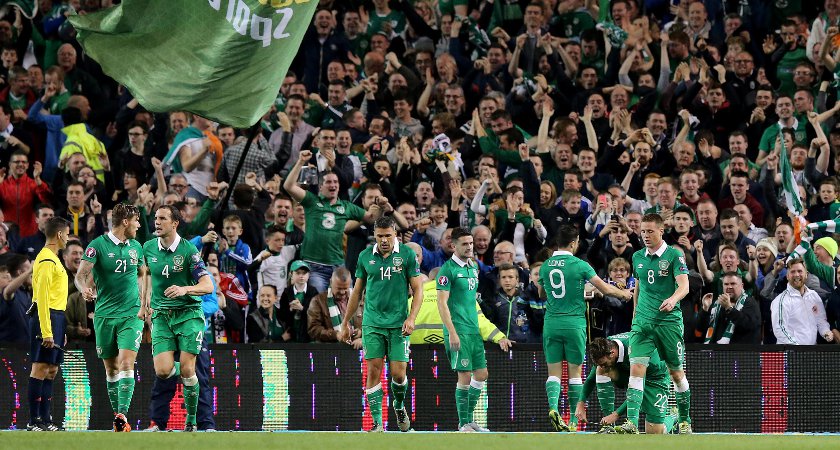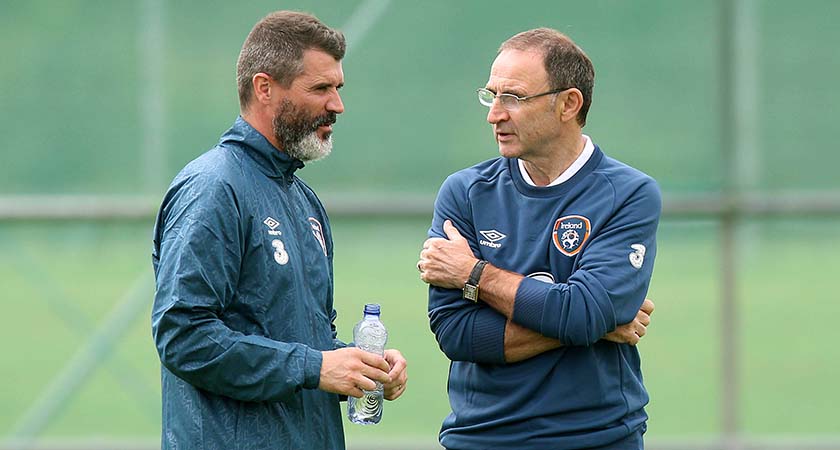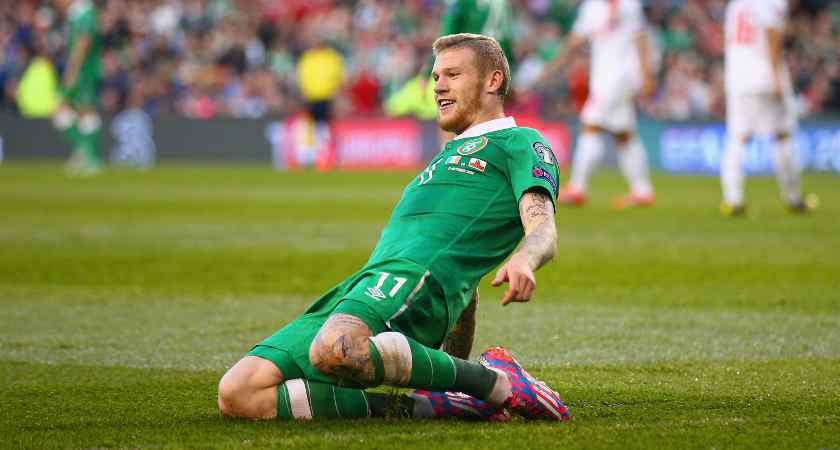FOUR years after setting up camp in the hotel next to where World War II started, this time around the Republic of Ireland will be based in Versailles, where the peace treaty to end the First World War was signed. If nothing else, this squad are historic tourists.
It's their own history they are looking to make this summer, though, when they aim to qualify from their European championship finals group for the first time, after falling short on the two previous occasions they kept company with the continental elite – agonisingly so in Euro 88, embarrassingly so in Poland four years ago, when their hotel base was considered unsuitable.
Being located next door to the Grand Hotel, where Adolf Hitler watched the German navy destroy its Polish counterpart in the Baltic Sea in September 1939, raised an eyebrow or two, but the fact that the Irish players felt trapped on the fourth floor of their Sopot hotel became a hidden issue of discontent.
Impressively, but also smartly, the players opted not to make a song and dance about this issue.
"How could we?" one of them said. "Our performances were awful. We were getting hammered enough as it was. Can you imagine what the backlash would have been had we complained about being stuck in a five-star hotel?"
So they kept quiet. Unfortunately, many of their fellow guests didn't. Players were woken by 3am singsongs while 150 metres away, in Sopot's main square, the party went from dusk to dawn. Little wonder, then, that Martin O'Neill and Keane thought long and hard about where to stay this summer.
Choosing a hotel, however, will be the least of their worries between now and June. Selecting a squad, firstly, and a starting XI secondly, will be the issues – rather than the noise of a street party – that will keep them awake at night.

“Narrowing it down to 23 players will be hard,” Roy Keane, the Ireland assistant manager, said. “But you always say to the players who are not playing — Aiden McGeady, Gibbo [Gibson], Pearcey [Alex Pearce] — that it is important they go and get [club] games under their belts because it will be very difficult for the manager to pick lads who may not have kicked a ball in six months.
“I always think the players pick the team and the squad. What I mean by that is that if lads are out there performing, there is a good chance they will be travelling. If not, then it will be difficult for them.”
In many respects then, this January is when the journey to France really begins for this squad. Those who are unemployed – in a sporting rather than a financial sense – need to engineer a move. That's Gibson, Pearce, McGeady, Anthony Stokes, David Forde, Marc Wilson, Shay Given.
If this seems particularly harsh – especially in light of McGeady scoring twice in Georgia to secure a 2-1 victory at the start of the Euro 2016 qualifying campaign – then that's just the way it is. O'Neill, rightly, doesn't cosy up to players. The way he sees his job is that players need to make him happy, rather than the other way around.
“From here on in, players’ activity with their club becomes an important issue,” O’Neill said. “And the players realise this. If they seriously want to get involved and want to show me what they can do, they need to be playing with their clubs.
“I can’t go into the summertime carrying players who have maybe played two or three games all season. I certainly can’t carry a host of players doing that.
“There’ll be one or two maybe who I might think ‘well, maybe he can do something for us,’ even though he has not played the requisite number of games. But from January on, players have got to be thinking about playing [club] matches.
 "Narrowing it down to 23 players will be hard,” says Roy Keane (left)
"Narrowing it down to 23 players will be hard,” says Roy Keane (left)“People like McGeady have to play. Absolutely. Darron Gibson needs to play. We’ve got a number of players who have got the potential to be there with us. And Aiden is one of those."
John O'Shea is another whose position in the starting XI, rather than the squad, is at stake. Like Robbie Keane before him, O'Shea quickly learned that past achievements – and friendships – count for little with this Irish management. Selected for each of the ten group games, he was unceremoniously dropped for the second-leg of the play off after returning from an injury and suspension.
With his 35th birthday approaching – and yet another relegation fight to get his head around at Sunderland – O'Shea isn't just fighting against time and the drop, but also Ciaran Clark and Richard Keogh, who excelled in Ireland's two play-off games.
“We knew when we took the job, these lads can’t stay around for ever,” Keane said. “Credit the lads who have stepped in, Richard Keogh, Clarky [Ciaran Clark]. They’ve done well. John’s an intelligent guy. He knew there’s competition for places. That’s what Ireland needs, more competition for places.”
Certainly there is plenty of that in a squad that may lack quality but has plenty of quantity.
Throughout the qualifiers, O'Neill chopped and changed so much that no one – possibly not even him – knows his preferred starting XI. Three goalkeepers were used – Given, Forde and Darren Randolph – and yet a fourth, Rob Elliot, is the only one playing regularly at the minute.
Could he be parachuted into the travelling squad? You'd have to think so. At 40 and injured, there is a possibility that Given may never play for Ireland again. He's at that age where you have to consider the worst.
Then there's the defence. Seamus Coleman, Keogh, Clark and Robbie Brady were the last men standing in the backline when the final whistle sounded against Bosnia-Herzegovina – but prior to them Cyrus Christie, O'Shea, Wilson, Stephen Ward all featured. Will all eight travel to France? Possibly – especially as Ward, Brady and Wilson offer flexibility.
Midfield, meanwhile, is an even greater area for debate. Glenn Whelan, Jon Walters, James McCarthy, James McClean and Jeff Hendrick are guaranteed a seat on the flight; McGeady, Gibson, Stephen Quinn and even Wes Hoolahan (who all started qualifiers) face an anxious wait. All the more so, because Harry Arter and Alan Judge have both caught the assistant manager's eye.
 James McClean [Picture: Inpho]
James McClean [Picture: Inpho]“That is the hope we have; that there might be lads in the background who will make a late charge.”
He has seen it happen before. Prior to Saipan and all that, he was in the team hotel when Steven Reid arrived smiling, his two-week holiday in Barbados cancelled, ready to play his part after he was parachuted into the panel in the aftermath of Mark Kennedy's withdrawal from it.
"I remember the game after we qualified for the 2002 World Cup," Reid said. "I was still at Millwall. We had Barnsley away. And that game was the most important one of my career because I knew if I was going to make it, I'd have to step up."
He did. "And my life changed." Now who will make the step in 2016? Arter, superb against Manchester United for Bournemouth just days after his daughter died in childbirth, is the likeliest candidate.
Aggressive in the tackle, he is also aggressive in his passing, constantly seeking out the difficult, defence-splitting pass. "He wants to get on the ball, he wants to make things happen, which is great for us," O'Neill said. "Naturally we’ll need all the ability that we possess.”
Which is why Andy Reid cannot be discounted. So long out of the international picture, his return would be the wildest of wild-card choices. Yet Keane rates him – he signed him for Sunderland remember – and O'Neill also believes he could do a job if he can overcome his groin problems.
![Martin O'Neill [Picture: Inpho]](https://media.irishpost.co.uk/uploads/2015/10/Martin-ONeill-Germany-N.jpg) Martin O'Neill [Picture: Inpho]
Martin O'Neill [Picture: Inpho]And one of those is Robbie Keane. Being in the winter of his career, Keane has had to accept his demotion to the bench, yet has done so with good grace. "I couldn't speak any higher of him in terms of his attitude," O'Neill said.
However, he's no longer the prolific force of old. "A 27-year-old Robbie Keane would play every game, no question."
The 35-year-old version, however, rarely plays. And yet O'Neill wants him to be around the team hotel and the training ground, knowing what he can contribute to team morale and knowing, too, that he may yet have something to offer on the park.
“If these tournaments are slow-quick-slow in terms of style, rather than a typical qualification game at home where we have to try and press teams, the game might actually suit Robbie. He might be able to take a breather or two during the games. I will have to have a look at it as time goes on. I’m never going to pick some players for sentiment sake. If I did that, I shouldn’t really be managing.”
So Keane will be there on merit, likewise Given if he recovers and is fit. As for the other 21 members, who knows? Even O'Neill doesn't. Yet.

